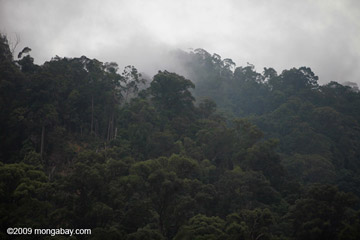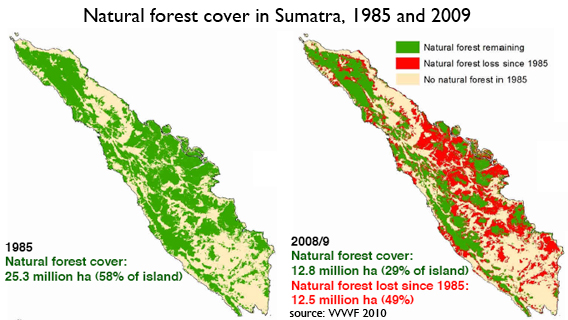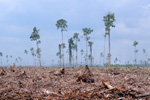National Geographic Society products include fiber from the destruction of tiger habitat.

Sumatran tiger in captivity. Only 400 Sumatran tigers are believed to survive in the wild. Photo by: Rhett A. Butler.
A new report by Greenpeace has found a direct link between National Geographic Society (NGS) products and rainforest destruction in Indonesia that threatens tigers and orangutans. An analysis on National Geographic books found Sumatran rainforest fiber from Asia Pulp and Paper (APP), a brand whose suppliers have been linked to rainforest destruction in Sumatra, and, in the most recent Greenpeace report, alleged illegal logging of protected rainforest trees. One of the world’s largest non-profit science and educational organizations, National Geographic is known worldwide for its magazines, documentaries, and award-winning photos. The organization also has a long-standing history of championing environmental and conservation issues. However, National Geographic says it has not sourced APP paper in “several years.”
“Any company buying from APP should distance themselves from this illegal rainforest scandal and stop buying from [APP] until they clean up their act,” Bustar Maitar, Head of the Forests Campaign for Greenpeace Indonesia, said in a press release.
The National Geographic coffee-table book Global Birding tested positive for Mixed Tropical Hardwoods (i.e. rainforest) and acacia, which was milled at APP’s Indah Kiat Perawang in Sumatra.
“National Geographic is committed to sourcing sustainable products and controlling the materials used in the production to the extent possible,” a spokesperson for National Geographic told mongabay.com. “We do not use APP products in our current books. While there may be a few books in our inventory that were printed on APP paper, we no longer use materials supplied by this company and have not for several years.”
National Geographic did not specify when they cut ties with APP, but the book in question was published as recently as September 2010, less than two years ago. APP lost its Forest Stewardship Council (FSC) certification in 2007 due to its continued reliance on companies pulping Indonesia’s rainforest.
The report by Greenpeace also included a year-long undercover investigation that found logged protected species, known as ramin, at the mill. If ramin is detected in U.S. products it could spur a federal investigation under the Lacey Act, which prohibits the sale and trade of wood products in the U.S. that are known to be illegally sourced.
 Small-scale clearing of forest in Sumatra. Pulp and paper manufacturing involves large-scale clear-cuts. Photo by: Rhett A. Butler. |
APP has been targeted by conservations groups like Greenpeace and WWF for years due to its dependence on companies logging rainforests and peatswamp forests in Sumatra for its paper products. Sumatra suffers from among the highest deforestation rates in the world: between 1985 and 2007 the island lost nearly half of its forest cover from logging, conversion into monoculture plantations, and forest fires.
Conservationists are especially concerned about the fate of the Sumatran tiger (Panthera tigris sumatrae), which is down to around 400 individuals and listed as Critically Endangered by the IUCN Red List. Ironically, National Geographic magazine recently covered the tiger crisis in December 2011 in its U.S. magazine, including an eye-popping photo of a Sumatran tiger caught on a camera trap.
But even more than the tiger is at stake. Sumatra is home to thousands of forest-dependent species, including the Sumatran orangutan (Pongo abelii) and the Sumatran rhino (Dicerorhinus sumatrensis), both also listed as Critically Endangered. In addition destruction of Sumatra’s forest and peatlands has made Indonesia one of the world’s top emitters of greenhouse gases and brought logging companies into conflict with local people dependent.
On its website, National Geographic states that it now purchases paper from Verso Paper in Maine. The organizations also states “that all products manufactured and delivered for NGS comply with all local and national laws and regulations. The purchaser and/or manufacturer must ensure that all supplied paper and other materials conform to the Lacey Act as amended in May 2008. In addition, any materials, paper or other forest product must be sourced in compliance with internationally accepted forestry protocols. No paper or other materials shall be derived from high conservation value forests or other illegal sources. All materials must be harvested sustainably.”
National Geographic was not alone; Greenpeace found numerous companies producing products with Sumatran rainforest fiber—including Xerox, Wal-mart, Barnes and Noble, Parragon Publishing, and Danone among others—but National Geographic is notable not only as a non-profit, but for its over century-long commitment to conservation.
UPDATE: Greenpeace has written that they are confident that National Geographic is ending any relationship with APP, noting in a blog post: “National Geographic has notified us that they wont use any APP paper. We’ve discussed with them our research, including evidence linking them to APP and Mixed Tropical Hardwood fiber in the past.”
Greenpeace has stated that it has handed over evidence of illegal logging by APP suppliers to Indonesian police; an investigation looks likely.

Related articles
Investigation links APP to illegal logging of protected trees

(03/01/2012) A year-long undercover investigation has found evidence of Asia Pulp and Paper (APP) companies cutting and pulping legally protected ramin trees, a practice that violates both Indonesian and international law. Found largely in Sumatra’s peatswamp forests, the logging of ramin trees (in the genus Gonystylus) has been banned in Indonesia since 2001; the trees are also listed under Appendix II of the Convention on International Trade in Endangered Species (CITES) and thus require special permits to export. The new allegations come after APP, an umbrella paper brand, has lost several customers due to its continued reliance on pulp from rainforest and peatland forests in Sumatra.
Some toilet paper production destroys Indonesian rainforests, endangering tigers and elephants

(02/09/2012) American consumers are unwittingly contributing to the destruction of endangered rainforests in Sumatra by purchasing certain brands of toilet paper, asserts a new report published by the environmental group WWF. The report, Don’t Flush Tiger Forests: Toilet Paper, U.S. Supermarkets, and the Destruction of Indonesia’s Last Tiger Habitats, takes aim at two tissue brands that source fiber from Asia Pulp & Paper (APP), a paper products giant long criticized by environmentalists and scientists for its forestry practices on the Indonesian island of Sumatra. The brands — Paseo and Livi — are among the fastest growing, in terms of sales, in the United States.
WWF: Asia Pulp & Paper misleads public about its role in destroying Indonesia’s rainforests

(12/16/2011) Asia Pulp & Paper (APP) continues to mislead the public about its role in destroying rainforests and critical tiger habitat across the Indonesian island of Sumatra, alleges a new report from Eyes on the Forest, a coalition of Indonesian environmental groups including WWF-Indonesia. The report, titled The truth behind APP’s Greenwash, is based on analysis of satellite imagery as well as public and private documentation of forest cleared by logging companies that supply APP, which is owned by the Indonesian conglomerate, Sinar Mas Group (SMG). The report concludes APP’s fiber suppliers have destroyed 2 million hectares of forest in Sumatra since 1984.